Mish's Global Economic Trend Analysis |
| "Real" and "Unreal" Wages; Five Decades of Middle Class Decline in Pictures Posted: 20 Jun 2014 12:11 PM PDT What follows is a guest post from Doug Short at Advisor Perspectives. This post has its roots in a discussion we had about "real" (inflation-adjusted) wages. Doug took our initial discussion and merged it with the number of hours people work. Here is the decidedly bleak result: Real weekly earnings were $825 in 1973. Today they are $690. Doug Short Guest Post As a follow-up on some collaboration with Mike Shedlock in advance of his recent commentary on wages over time, here's a perspective on personal income for production and nonsupervisory private employees going back five decades. The Bureau of Labor Statistics has been collecting data on this workforce cohort since 1964. The government numbers provides some excellent insights on the income history of what we might think of as the private middle class wage earner. The first snapshot shows the growth of average hourly earnings. The nominal data exhibits a relatively smooth upward trend. 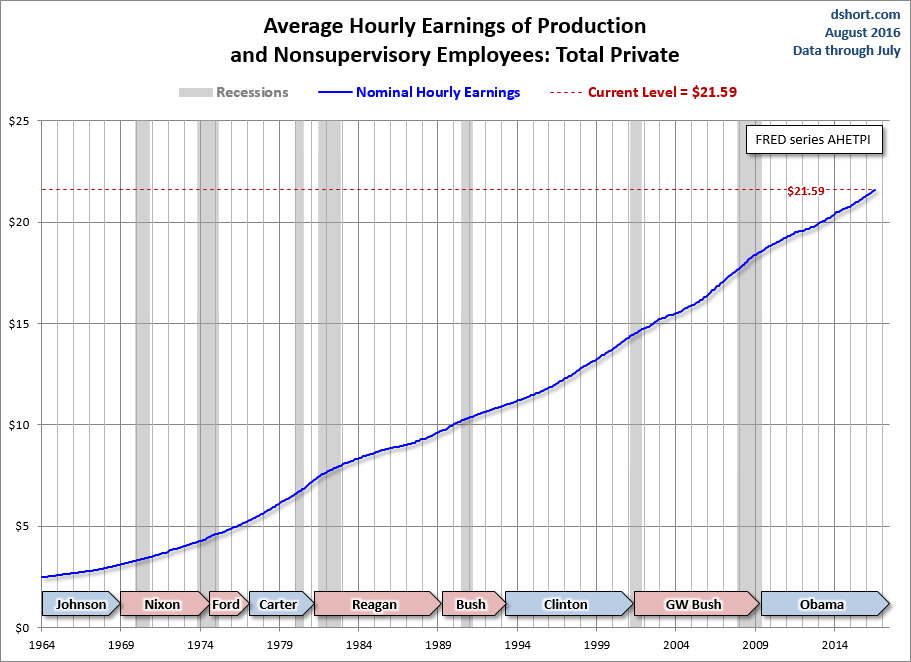 here are, however, two critical pieces of information that dramatically alter the nominal series: The average hours per week and 2) inflation. The average hours per week has trended in quite a different direction, from around 39 hours per week in the mid-1960s to a low of 33 hours at the end of the last recession. The post-recession recovery has seen a disappointingly trivial 0.7 bounce (that's 42 minutes). 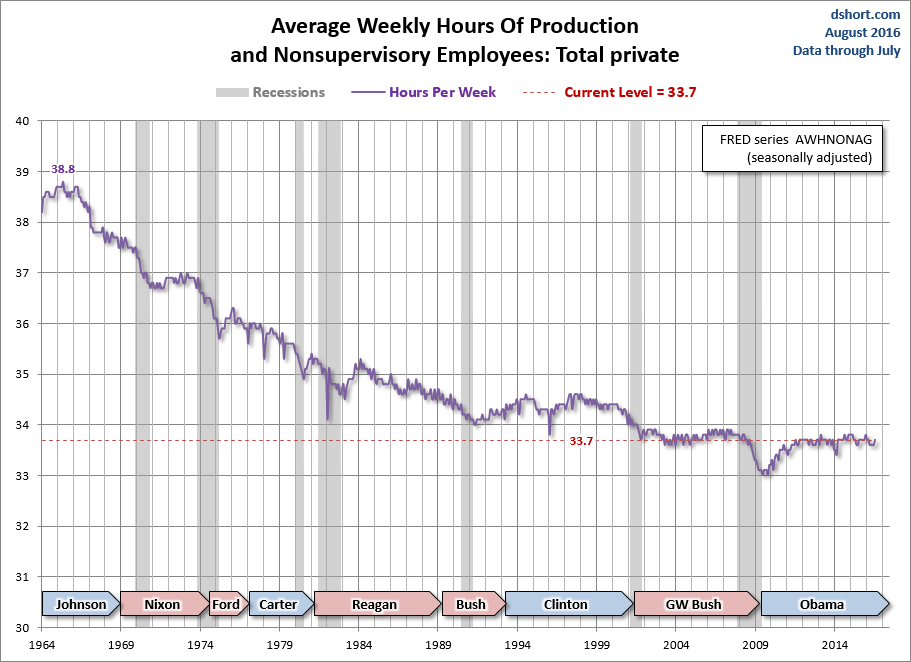 What about inflation? The next chart adjusts hourly earnings to the purchasing power of today's dollar. I've use the familiar Consumer Price Index for Urban Consumers (usually abbreviated as the CPI) for the adjustment. Theoretically, the CPI is designed to reflect the cost-of-living for metropolitan-area households.  Now let's multiply the real average hourly earnings by the average hours per week. We thus get a hypothetical number for average weekly wages of this middle-class cohort, currently at $690 -- well below its $825 peak back in the early 1970s. 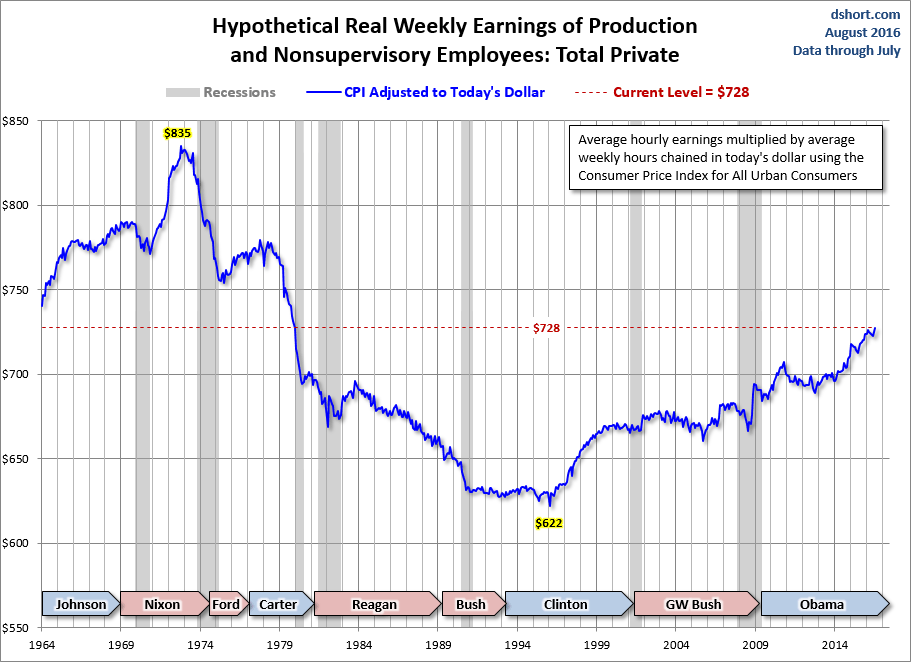 Note that this is a gross income number that doesn't include any tax withholding or other deductions. Latest Hypothetical Annual Earnings: $35,000 If we multiply the hypothetical weekly earnings by 50, we get an annual figure of $35,497. That's a 16.4% decline from the similarly calculated real peak in October 1972. I've highlighted the presidencies during this timeframe. My purpose is not necessarily to suggest political responsibility, but rather to offer some food for thought. I will point out that the so-called supply-side economics popularized during the Reagan administration (aka "trickle-down" economics), wasn't exactly very effective for production and nonsupervisory employees. Footnote for economist geeks: Here is a slightly different look at the data. I've adjusted using the less familiar Consumer Price Index for Urban Wage Earners and Clerical Workers, which among other things, assigns a higher weighting to gasoline (e.g., longer drives to work and the grocery store). Also, this is the series the government uses to calculate Social Security Cost of Living Adjustments (COLAs). Here is the real hourly history with this deflator. 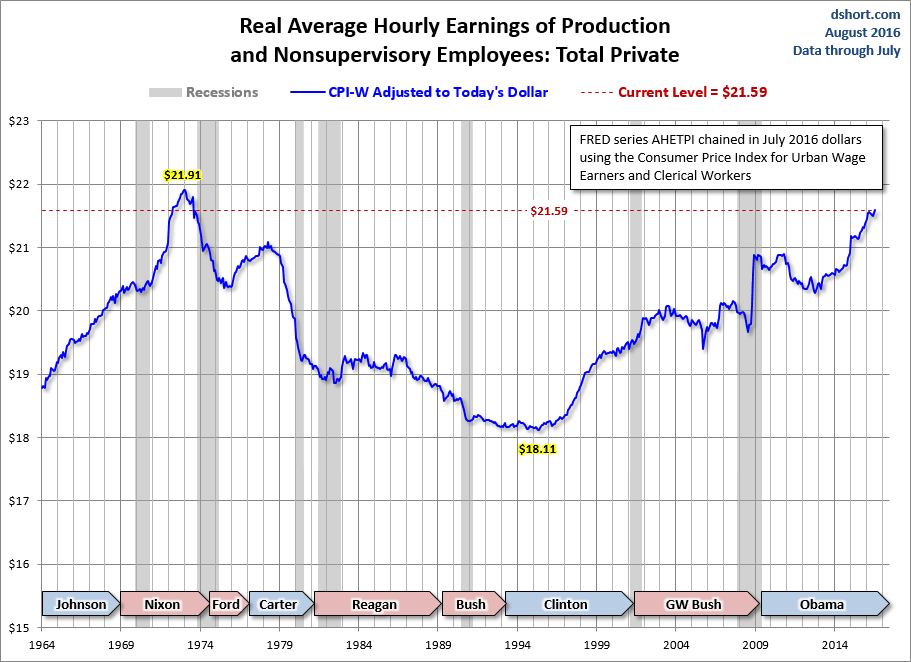 Here is the real hourly data multiplied by the average weekly hours. The latest data point is 14.1% below the 1972 peak. 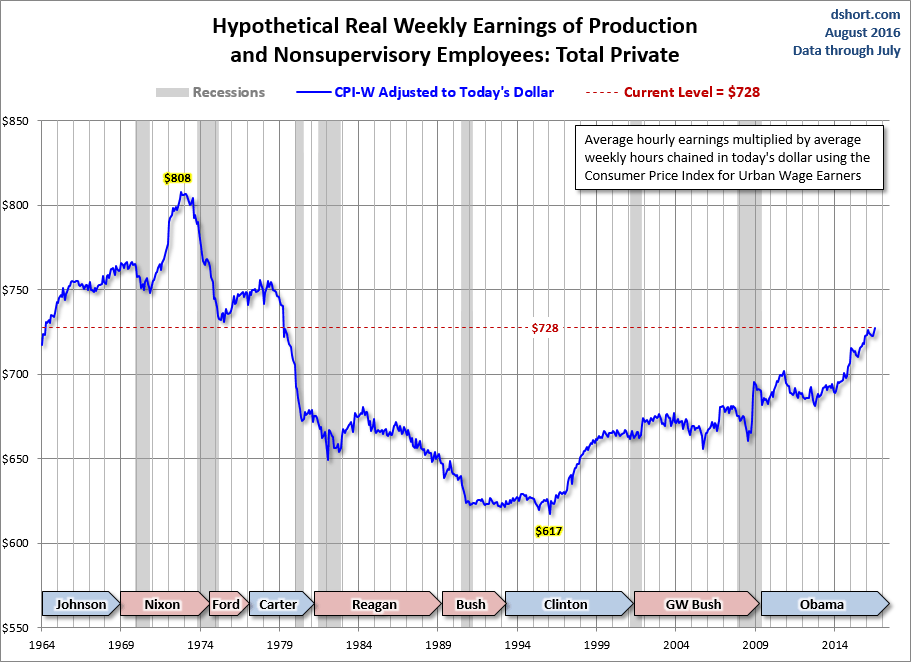 For additional perspectives on earnings, see my commentaries on household income.
End Doug Short Real vs. Unreal Wages and Earnings I asked Doug if we could factor in social security, disability, and income taxes. Ideally, we would also need to factor in property taxes, sales taxes, and fees. One might also want to factor in food stamps and other transfer payments. Unfortunately, there is no realistic way to easily do all that. Instead, let's take a look at Historical Payroll Taxes from the Social Security Administration. In 1973 the combined Social Security and Medicare payment was 5.850%. Today it is 7.65%. Given that workers making wages as shown in the charts above would not have hit the FICA limit, it would be reasonable to subtract an additional 1.8% from today's weekly $690 weekly figure. Each person would need to do sales taxes for their own state. Today the Illinois minimum sales tax rate is 6.25%. Depending on localities, it can be as high as 9.75%. I cannot find a historical table, probably on purpose. No state would want to publish such a thing, but I seem to recall something like 4%. Whatever the rate, assuming most people making these wages spend damn near everything, it would be safe to subtract the difference, whatever it is. Do the same for income taxes, which Governor Quinn recently raised from 3% to 5%. Realistically, there is nothing "real" about "real" earnings and wages. Thus we must look at "unreal" wages (incorporating all of the above ideas) to get the true picture. It is very safe to say, the decline in "unreal" weekly earnings from $825 in 1973 to $690 today, understates the decline by a huge degree. "Unreal" wages ignores transfer payments that come out of some else's pocket. Of course "unreal" is really "real" and "real" is really "unreal", so it's easy to be confused. Who to Blame? I have outlined on many occasions who is to blame for this sorry state of affairs. The answer is the Fed, fractional reserve lending, and government bureaucrats. Nixon closing the gold window was icing on the cake. The Fed is hell bent on achieving inflation. Wages did not keep up because it was easier to outsource. In-sourcing is now the buzzword, but the Fed has cost of money so low that it's easy for corporations to borrow money and invest in technology and software to replace workers. That would be a lot harder to do if wages were $2.50 an hour. And most people would be a lot better off if prices were correspondingly lower as well. Those with first access to money (governments, banks, the already wealthy) are the only ones who gain from inflation. Everyone else loses. The result is a shrinking of the middle class. Instead of pointing the finger at the real problem, the Fed blames robots and Democrats blame corporations and Republicans. Meanwhile, Republicans and Democrats alike fund wars and other activities via the printing press that the US cannot possibly afford. If routine price inflation did not benefit the banks and the wealthy at the expense of everyone else, we probably would not have it. The word that best describes the process is "theft". For further discussion of the demise of the middle class and the role president Nixon and Congress played, please see Time Lapse Image of Growing US Political Polarization; Root Cause of the Shrinking Middle Class Mike "Mish" Shedlock http://globaleconomicanalysis.blogspot.com |
| Absurdities, Blatant Lies, Chutzpah, Political Expediency, Odd Couples Posted: 20 Jun 2014 01:04 AM PDT The mess in Iraq is complicated by absurdities, political expediency, blatant lies, and self-serving accusations. Everyone involved attempts to absolve themselves of guilt. Some high-profile politicians even changed their minds as a matter of political expediency. Absurd and Conflicting Realities
It is impossible to untangle that mess. Moreover, arms given to Syrian rebels eventually make their way into the hands of Isis and Iraq. Nonetheless, many Republicans and some democrats accused Obama of not providing enough assistance to Syrian rebels, most of which are Al Qaeda or Isis connected. Shia Sunni Divide A PEW research report discusses the Sunni-Shia Divide  Their shared demographic makeup may help explain Iran's support for Iraq's Shia-dominated government led by Prime Minister Nouri al-Maliki.Blatant Lies, Self-Serving Accusations, Amazing Chutzpah In an attempt to whitewash history and absolve himself from guilt, former UK Prime Minister Tony Blair defended his role in the war. For my takedown of Blair, please see Tony Blair's Disingenuous, Self-Serving Analysis of Iraq Blair's lies and distortions were followed by an even more nauseating defense of the war by Dick and Liz Cheney in a Wall Street Journal op-ed called The Collapsing Obama Doctrine. CNN writer Paul Waldman brilliantly took Cheney to task in Dick Cheney's Amazing Chutzpah on Iraq. You have to hand it to Dick Cheney. How many people, knowing what has happened in Iraq over the last 12 years, would dare to write an op-ed in The Wall Street Journal containing this line: "Rarely has a U.S. president been so wrong about so much at the expense of so many" -- and not be talking about George W. Bush? The man has chutzpah.Informed Comment University of Michigan history professor Juan Cole makes some very interesting observations on Sectarian Blowback in an interview exchange with Amy Goodman of Democracy Now. I truncated some of Cole's responses. AMY GOODMAN: Explain, Professor Cole, who the forces are. Who is ISIS? Who is ISIL? Where does al-Qaeda fit into all of this? JUAN COLE: Well, the Islamic State of Iraq and Syria is also called the Islamic State of Iraq and the Levant in English. It's just a matter of how you translate one of the words. So they're the same organization. Isis is al-Qaeda affiliate, although recently the core al-Qaeda has displayed discomfort with it because it attacks other al-Qaeda affiliates. It's an extremely nasty organization. It blows up soft targets, children at ice cream shops. It'll blow up a marriage and then come back and blow up the funeral that evening. It's the worst of the Sunni resistance groups. The Sunnis were in power before the U.S. invaded in 2003, and they've been dethroned and made unemployed and marginalized, and so there is various kinds of discontent, civil and demonstrations, but also a turn to terrorism. AMY GOODMAN: Juan Cole, can you respond to Secretary of State John Kerry and also talk about the Bush role in this, in fueling this kind of sectarianism, if you feel he did? JUAN COLE: Well, the Bush administration very explicitly sided with the Shiites and wanted to create a Shiite-dominated government and enthusiastically cooperated in the de-Baathification or the firing of thousands and thousands of Sunni bureaucrats and teachers from their jobs. So this—this was a policy of the Bush administration, and it is, in some large part, responsible for the current crisis. AMY GOODMAN: What about the talks the U.S. is having now with Iran? And can you talk about whether its interests, the U.S. government now, is—are allied when it comes to Iraq with Bashar al-Assad of Syria? JUAN COLE: Well, I think the U.S. interests are in fighting this kind of extremist group. After all, it was this kind of hyper-Sunni extremism that hit the United States on 9/11. The al-Qaeda kind of organizations in the Middle East typically despise Shiites as wretched heretics, and there have been many massacres of Shiites by the Taliban in Afghanistan, by al-Qaeda groups and their affiliates. Shiite power like Iran would be a natural ally. And so, I think it's likely that the United States will develop some relationships with Iran in this regard on this issue. And I think it's a good thing. I think it's crazy that in 2001, when the Iranians were having candlelight vigils for the United States and sympathized with the U.S. as victims of this kind of terrorism that Iran had also suffered from, that suddenly the Bush administration and David Frum, the speechwriter for Bush, put Iran in an "axis of evil" with a country like North Korea and alienated Iran. AARON MATÉ: I wanted to turn to comments made by former British Prime Minister Tony Blair over the weekend suggesting the current crisis is not linked to the 2003 U.S. and British invasion of Iraq. Blair was speaking to the BBC. ... Juan Cole, as we wrap, your response to Tony Blair? JUAN COLE: Well, Mr. Blair—you know, it would take hours and hours to refute everything that he said, all of which is false, but you should be—remember that he was perfectly willing to leave dictators in power. He took the British Petroleum officials to Libya to meet with Gaddafi, so it's simply not true that he went around overthrowing dictators in the Middle East. He did help to invade Iraq. And there, I mean, I think the outcomes are less of an indictment of him than the methods. Mr. Blair repeatedly lied to the public about this enterprise. He was advised by his attorney general that the whole thing was illegal in international law initially. He didn't share that memo with his own Cabinet. He hid it from the British public. He said it wasn't about oil, but we now know he was cooperating with BP officials to make sure that they got bids after the war was over. He just violated international law repeatedly, and British domestic law, in pursuing this war of aggression. AMY GOODMAN: Juan Cole, we want to thank you for being with us, professor of history at University of Michigan. His blog, "Informed Comment," at JuanCole.com. He's written many books. His most recent one is The New Arabs: How the Millennial Generation Is Changing the Middle East; it'll be out July 1st. Political Expediency Politics USA wrote on June 6, 2014, For The First Time Hillary Clinton Admits That She Was Wrong To Vote For The Iraq War. In her upcoming book, Hard Choices, Hillary Clinton completely admits that she made a mistake by voting for the Iraq War in 2002. Her admission that she got it wrong is a complete 180 from her defense of the vote during her previous presidential campaign in 2008.Genuine Change of Opinion or Political Expediency? Politics USA writes "Part of this is a likely fence mending with some primary voters who were turned off by her legalistic defense of her vote for war in 2008, but some of it is possibly insight gained from her time spent as Secretary of State." What insight did Clinton gain as Secretary of State? For the answer, please consider the June 5, 2014 CBS report Hillary Clinton's "Hard Choices": Bergdahl, Benghazi and more. On whether to arm Syrian rebels: [Clinton stated] "I returned to Washington reasonably confident that if we decided to begin arming and training moderate Syrian rebels, we could put in place effective coordination with our regional partners." There you have it. Hillary sides with John McCain and Dick Cheney and against President Obama on sending weapons to Syria, even though Saudi-supplied weapons made it into the hands of Al Qaeda and Isis terrorists, then on to Iraq. So what did Hillary learn about sponsoring war? Nothing. But she did learn that it is politically expedient to distance herself from Obama. Leap of Faith Cannot Fix Iraq Financial Times correspondent Gideon Rachman says The West Cannot Fix the Puzzle of Iraq Through War. Well-meaning liberals try to square the circle by arguing that military aid should be channelled to the more liberal forces fighting both the Assad regime and Isis, simultaneously. There is no doubt that there are some brave and admirable people in the Syrian opposition. But it is a huge leap of faith to believe that, if only the west piles in behind them, things will get better. On the contrary, there is plenty of evidence to suggest that "liberals" have very little chance of holding on to power, after the fall of a Middle Eastern dictatorship. From Iraq to Libya to Egypt, the pro-western liberals have been swept aside.The Odd Couple Curiously, Hillary Clinton has sided with leap-of-faith "expert" Dick Cheney. They deserve each other. I side with CNN Opinion writer David Wearing who says Ignore neo-cons, the last thing Iraq needs is more war. International jihadis had no real presence in Iraq before the U.S.-led invasion of 2003. Now, in no small part due to the ironically titled "war on terror" waged by Cheney, Wolfowitz and Blair, those forces now exert joint control over a huge swathe of the country. All in all, now would be a good time for the neo-conservatives and liberal interventionists who helped bring us to this point to commence a prolonged period of silence.I also side with Ron Paul. For details, please see Democrat Quotes on Iraq; Ron Paul Asks "Haven't We Already Done Enough Damage in Iraq?" Winning Action The only winning action has always been to not get involved. But we got involved and made a huge mess. Nonetheless, warmongers cry for still more involvement. With the situation this messy, with conflicts going back 1,400 years, and with a history of blowback after blowback, both political parties need to take a lesson from the 1983 film War Games in which a computer learns "the only winning move is not to play." Mike "Mish" Shedlock http://globaleconomicanalysis.blogspot.com |
| You are subscribed to email updates from Mish's Global Economic Trend Analysis To stop receiving these emails, you may unsubscribe now. | Email delivery powered by Google |
| Google Inc., 20 West Kinzie, Chicago IL USA 60610 | |
No comments:
Post a Comment